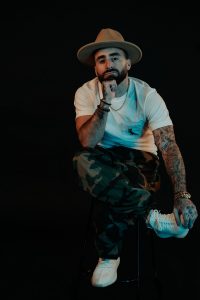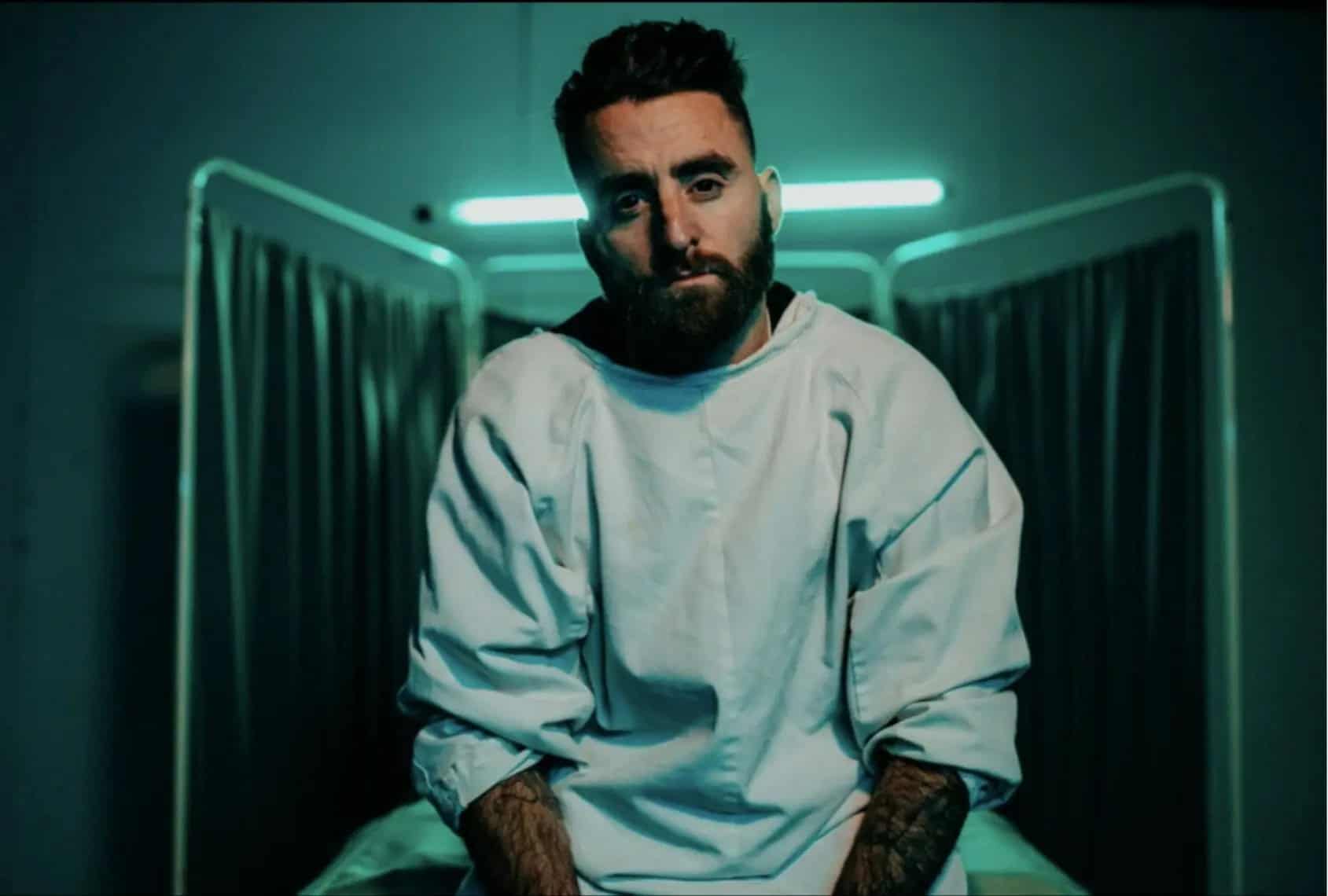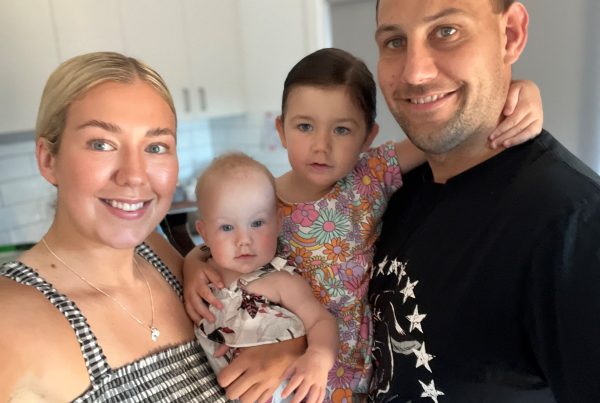Podcast: Play in new window | Download
Subscribe: Apple Podcasts | RSS
“CF makes us resilient,” In this episode of the CF Strong podcast, co-host Sam Lefoe catches up with Rafi to discuss life with Cystic Fibrosis.
Rafi, 41, was diagnosed with Cystic Fibrosis at birth. However, he says CF gave him a unique perspective on life and death, which fueled his curiosity and desire to explore. This exploration led him to storytelling through photography and filmmaking, allowing him to share his life story and experiences.
 One of Rafi’s notable projects is a hip hop album titled “Life Expectancy,” which delves into the complexities of living with CF. The album also includes a documentary called “Breathe,” which offers an intimate portrayal of the challenges faced by individuals with Cystic Fibrosis.
One of Rafi’s notable projects is a hip hop album titled “Life Expectancy,” which delves into the complexities of living with CF. The album also includes a documentary called “Breathe,” which offers an intimate portrayal of the challenges faced by individuals with Cystic Fibrosis.
During the conversation, Sam and Rafi find common ground in their shared experiences as people living with CF. They discuss the various challenges they’ve faced and the resilience they’ve developed as a result.
The duo also touch on having siblings with CF, life expectancy, and coping mechanisms, before offering some advice and insights to younger people living with CF.
Voiceover: Welcome to the CF Strong Podcast. CF Strong covers the successes and challenges faced by those living with cystic fibrosis. You’ll hear first-person stories, conversations with health professionals, friends and partners. Just a heads up, guests may share their personal views about treatments and health management, but please remember, this is not medical advice, and you should always follow the advice of your clinic team regarding your health.
Sam: Hello everyone and welcome back to the CF Strong Podcast. My name is Sam. I am your host today, and today with me, I have Rafi. How you doing Rafi?
Rafi: I’m doing good, man. Thanks for having me.
Sam: Yeah, it’s great to have you on. Do you want to just start off by telling us a little bit about yourself and about your life?
Rafi: Well, my name’s Raff. I’m 41 years old. I was diagnosed with cystic fibrosis at birth. I was born in Johannesburg, South Africa and moved here in when ’86, ’87. Since then growing up with Cystic fibrosis, I think Cystic Fibrosis has given me a very interesting perspective on life and death which has made me question a lot of things and become very observant and wanted to understand lots of things, which sort of led me into a path of storytelling. Being one that is very compassionate and has a lot of empathy for other people through understanding my own condition. I’ve learned to understand and help other people tell their stories. So it’s like through photography and filmmaking. In 2014, I decided to tell my own story and turn my life into a hip-hop album. And from there I finished that in early last year. I think I finished that and put that out. That was just to give a different perspective and help people and tell my story. Yeah.
Sam: Yeah. And I’ve listened to your album actually. It’s very inspiring. Just remind me, is it called Breeze or Breeze or Breath or?
Rafi: The album’s called Life Expectancy.
Sam: Life Expectancy, yes. Yeah.
Rafi: There was a documentary that I did, which sort of just highlighted the album, which was called Breathe.
Sam: That’s right.
Rafi: And one of the songs was called Breathe, which was actually going to be called Life Expectancy. It was going to be the title song of the album. And then I just decided just to do a different name for the song.
Sam: Yeah. No, it’s a very inspiring album and documentary actually. It’s funny how you say it’s the perspective on life and death. I believe during these podcasts, talking to many people like us with CF just the, the, the outlooks on life are all very similar ’cause Through, I guess these shared experiences, it’s makes people very resilient.
Rafi: Yeah. Definitely makes us resilient. I think one of our coping mechanisms is, is acceptance. I mean, how many people do you know have passed away with CF, personally?
Sam: Personally it’s not too many ’cause unfortunately, when I was growing up it was kind of the beginning of how they were stopping people with CF interacting.
Rafi: Oh.
Sam: Yeah. ’cause I was born ’98 and I think in the early 2000s, that’s when people started to really —
Rafi: Segregate.
Sam: Yes. Yeah. So I unfortunately didn’t know many people at all.
Rafi: In the 80s and 90s we were six in a room.
Sam: Yeah.
Rafi: And they just dropping like flies.
Sam: Yeah. It’s very, very hard to think about but I guess I haven’t exactly been too exposed. I’ve definitely known of people who have passed away, not talked to them. And, but it’s never really been a personal connection because unfortunately that was just not really available to me when I was a bit younger.
Rafi: Yeah. it was definitely a thing and like, just even being in hospitals. You were open to so many other people, meeting other people with other conditions as well. Especially like at the Children’s Hospital was definitely a hotspot for that. I think with CF we do have this this outlook of — Well, I mean, when I was born, it was still considered a death sentence, I guess. It was the children’s disease. Like, kids don’t grow past five, six, if you’re lucky, you’ll get to your teens. So I know a lot of people with CF, myself, my brother and some other people who, you know, and now in their forties and we’re like, “Oh, we never really financially set ourselves up to live this long. We never thought we’d, we’d live this long and, and now we’re struggling because it just wasn’t in the plan.”
Sam: Yeah. I guess when you have that kind of life expectancy hanging over your head, it really does force you or you force yourself to always be in the moment.
Rafi: That was the concept for the album.
Sam: Yes, of course. Yeah. It’s actually really interesting you bring that up, because again, when I was a bit younger, it was I guess it wasn’t as morbid as it was back in when you were a bit younger, but when you were, say, a teenager, you and you said your brother has CF as well.
Rafi: Yeah.
Sam: How were some of the coping mechanisms you guys had to I guess just stay positive and continue living the best life you could?
Rafi: I remember this one time we were taken into this room for this like cystic fibrosis information day at the Alfred. They just laid us all this information on us, like, “You’re never going to have kids, you’re not going to live this long. Cystic fibrosis is this.” It was just like this super traumatic experience. Yeah. And I just remember walking out like a zombie, and my brother just grabbing me by the shoulders and he is like, “This is not us. This is not what’s going to happen to us.” From then on, my brother was like, “Don’t think sick. Don’t feel sick. Don’t be sick.” If you don’t think it, you won’t be it. As positive as that sounds, there was also some negative to that because I found myself doing things to convince myself I wasn’t sick.
Sam: Yeah.
Rafi: So, in grade four I was at an indoor cricket birthday party at one of those cricket centers. I walked into the bathroom and there was some older kids in there, and I was smoking and I was like, “Can I have a cigarette?” And I was smoking this cigarette and I didn’t cough. And I was like, “Whoa. How could I be sick if I can like smoke a cigarette and not cough?” So these were just some of the things that just began a bit of my negative coping mechanisms to prove to myself, well, if I can do this, then I’m obviously not sick. I remember also in probably like grade two or three, like, I just stopped taking medicine at school for food. I was just like, “I’m just not going to take my medicine. I don’t know why I was like just test, just being really defiant to myself. I don’t think it worked very well.
Sam: Yeah. that’s, that’s something I can definitely relate to ’cause when I was growing up I was quite sheltered. ‘Cause my parents a lot like your brother were telling me that, “Don’t think sick, just live your life. If you live your life as a healthy person, you’ll be a healthy person.” Which as you said, it’s an incredible bit of its inspiration, but at the same time, it can really, I guess, plant that feeling in your mind that if you just pretend everything’s fine, everything will be fine.
Rafi: Exactly.
Sam: And you find yourself doing things, as you said, to prove to not the world, but mainly to yourself that you’re okay.
Rafi: Well, the worst thing is not the things that you do to prove to yourself, it’s just things you don’t do. You don’t do your treatments. You don’t do your medications, you don’t look after yourself. You’re just like, “Oh, I’m fine.”
Sam: Yeah. That was, that was my entire high school career was just I guess, lying to myself and lying to the people around me to just to prove a point.
Rafi: Yeah. Just to be not sick. Like the real work comes in when — It’s like driving. When you first get in a car and start driving, you’re thinking of all the things. Constantly thinking of everything. And then 10 years down the track, you don’t think about it at all. And I look at that the same as my treatments. Like if you put real effort into your routine of looking of all your treatments, they then became second nature and you’re no longer thinking about them. So it’s like all these people I met through the pseudo woke hippie movement of like, you know, “You can heal yourself. If your cells regenerate every however long it takes to regenerate them, then you can regenerate the broken ones. You just have to believe it.” I’m like, “Mmh.” Or I could just do my treatments every day and that I’m second nature and I can just live my life.” What is normal to me.
Sam: Yeah. Belief, belief is a powerful thing, but belief I guess is pointless if you’re not putting the work in as well.
Rafi: Yeah, exactly.
Sam: Yeah. It’s interesting you say that, but I just wanted to go back to some coping mechanisms as well, because you’re quite into your, your storytelling. And through your music, you tell a beautiful story about life with CF. Do you think that music was, I guess, as you got older, became a coping mechanism to work through CF or was it kind of like the CF inspired your music?
Rafi: When I first started rapping, I was just like free styling and rapping. I think some of the first raps I actually ever wrote were about living with cf. Like being how positive it made me. Nothing in this world that can never stop me when I’m faced with any dream or opportunity. See, I’ve been told that I’ve got this disability as long as I live, it won’t affect me or my ability. So it’s like all this stuff that’s like really positive. I think in my teens I was at that place where I was out at the raves and dancing all night. And there was like, people would always see me and they’ll be like, “Man, we can’t believe you –” Actually went to 10 schools.
Sam: Yeah, right.
Rafi: I went to 10 schools. I knew a lot of people. And then when the rave scene came around, all these underground raves, all these people from all these different places that I knew would come and they’d see me. And it’d been so long since they’d all see me, and they were like, “Holy shit, you’re still alive and you’re killing it still and you’re still dancing.” Then when I got into the rapping, it was just something that was just like, like there to talk about. I think I never actually put anything out because I felt that that same content was sort of very heavily done with other artists that were really big. I’d never wanted to sort of look like I was just doing the same thing as everybody else.
I kind of just shelved it for many years. And then when I was yeah, in like 2014 it just sort of dawned on me like, “Oh, hold on. I can just make a hip hop album dedicated to potentially going, taking it to schools and universities and talking to people who are studying the topics that I want to talk about to take into their — To give people the lived experience.” It wasn’t about making a commercially viable hip-hop album, it was just basically making more of like a positive educational album.
Sam: Yeah. Which is so important to have because I’m sure you’re aware of the currently online on health websites, things about CF are never quite put into a positive light, are they? It’s always very, very doom and gloom. Yeah, exactly. But yeah, I think it’s incredible that, ’cause I can, I guess I feel a little bit when I was growing up I felt a little bit of shame about my condition. So then for you to take what you have and put it into your music and put it into helping other people and getting the word out there. It’s an incredible skill to have. So I think it’s very, very important. So I hope you keep doing it, that’s for sure.
Rafi: Thanks man.
Sam: And so just going like to go on from that, ’cause you’ve talked about how your music, your CF inspired your music, and now you are using that to inspire other people, do you mind just telling us a little bit about how your life experience has now led you down to the path of wanting to help people?
Rafi: Sure. I think it’s always been there. I’ve always wanted to help people. I’ve always been drawn to — I think with my lived experience of all the different things that I’ve experienced and had to deal with, I can’t help it, but want to give people that information. Even at the gym all the time, like, I see people training and just with really bad form. They don’t know it, but I always want to help people. I think if you can, there’s two things you can do. You can either shut up and walk away or you can step in and say, “Hey man, can I help you with something?” It’s the same thing with the music.
If you don’t like it, you don’t have to listen to it. But if you can relate to anything that I’ve been through, whether it’s going through 10 schools having parents who were neglectful and emotionally abusive sometimes physically abusive or if you’ve lived with the health condition or someone with a health condition or you have a learning disability or you’ve struggled with anything, there’s something in my music that it is can relate to that. The thing with the music as well is that it’s my story, but it’s a story. And I think I had to like, you know, let go of the fact it was me who I’m talking about myself or my mom or my stepdad, whoever. It’s not even about them. It’s just about the story itself. That story of resilience and overcoming adversity and any obstacles that was put in your way.
I think through, through acceptance of self, you knowing that no one’s perfect and we all have problems, you learn to stop judging people. When I was younger, I knew a lot of people that would just walk down the street and be like, “Oh, look at that guy. Look at the pants he’s wearing. Haha, what an idiot.” It’s like, “Well, maybe those days his favorite pants, maybe he’s having really bad day and those pants making him feel good. Like, who are you to judge that person?” Once that sort of awareness started happening, I was like, “Oh, okay. I can really start to see how we — If I tell my story about how I accept myself and others, maybe then that will show other people how to accept themselves and others.” I think that’s just that chain reaction that I really wanted to set off to teach people how to – It’s like if you teach someone how to how to —
Like, there’s a few things that really sort of made me become aware of everybody’s similarities in a struggle. Instead of just telling people the similarities, you show people how you learn to see those similarities. It’s like you’re teaching people to learn. So it’s like once you start doing that, then, then it can really spread and everybody can sort of start to — You’ll tell someone something. I learned this. And they’ll be like, “h yeah, whatever.” Or you could say, this is how I learned this, this is how I became observant of this. And they’ll go, “Oh, okay.” All I did was plant a seed. So then they leave and then they see something and instead of just seeing something, they go, “Oh, oh, I see that. Oh, I relate that to this. oh, I relate that to me and this.” Then they come back and they’ll say something to me and I’ll see how it’s just grown. It’s like you just like plant these seeds of not what you learn, but how you learn things. I think that’s something that I learned and that really inspired me to put things out to, and talk to people to help people basically.
Sam: Yeah. I completely understand what you’re saying. It’s the old fashioned saying, it’s not the journey. I mean, sorry, it’s not the destination. It’s the journey. Because you can’t, you can’t go to someone and tell them exactly how you should think. You can only guide them down their own path to find their own way of thinking, I guess. Yeah. It’s a great, great way to put it. And just wanted to go back to your music and your rapping, because obviously, I’m assuming it was one of your dreams to be a performer. Is that true?
Rafi: Yeah. Well, I was always performing, I was like acting, dancing even. As a kid I was, I was like, I’d take some guitar and amplifier that I bought from like Kmart to school and do like these performances where I’d just like smash the guitar and make up words ’cause I don’t know what the hell I was doing.
Sam: But yeah. I love that. Would love to see that.
Rafi: There’s some photos of it. It’s hilarious. I’ve always felt, I don’t know — I’ve always just liked performing.
Sam: Yeah.
Rafi: That’s actually a big coping mechanism for some people with there’s a few conditions out there like CF or other ones where we we’re always performing. We’re always acting, we’re always acting fine. We’re always acting healthy. We’re always acting better than we are. When we are sick — Like, man, how often do you get sick or feel something and never take any painkillers? And then the one time that someone’s like, dude, “Just take this Panadol, or take this Neurophin.” And you take it and you’re like, “Oh my God, why the hell was I not taking it.”
Sam: Like, it happens far too often.
Rafi: We’re so like, we’re so resilient. It’s ridiculous.
Sam: Yeah. Sometimes too resilient. Because you can ignore things for so long until it becomes deadly, I guess.
Rafi: Yeah. Man, complacency is one of our biggest failures.
Sam: Completely agree with that. I do think it’s incredible that what you said about we’re always performing, because I never really thought of it in that way. But now that you say that, I can see exactly what you mean ’cause we’re always — People with CF maybe they always have two faces, one face they show the world and then one face they keep private. I think most of my life, I’ve definitely tried to put on that other face. The one that you showed to the world where everything’s okay. Everything’s all right. So, I can now completely understand how then music and performing can be a great outlet to finally get rid of all those pent up feelings. So just for other people listening, what were some of the challenges you came across, especially in regards to how your CF would then relate to how you perform? Because I can imagine possibly singing and rapping might cause a bit a strain. Was that ever an issue you found?
Rafi: Sometimes just get really out of breath or just tired or, but adrenaline’s a good thing. So you got to use all those things to your advantage, like the raspy voice or like the coughing. You just going to go with it.
Sam: Yeah.
Rafi: The worst part is like now going places and people are sick and you want to go see music and stuff, but public places are just like so dangerous now.
Sam: Yes, very true. Do you have any advice for, say some younger listeners with CF who have dreams of being performers and singers? Like what advice would you give to them?
Rafi: Use your strengths. Use your weaknesses as your strengths. Use your experience through your storytelling. Make light of it. I think there’s a comedian out now who’s got CF and he just makes a big joke of it. He’s doing really well. I don’t know his name. But people want to hear it. So whatever you’ve got, even if you don’t want to talk about CF at all, or being sick at all, you don’t have to, just do that opposite. Use what you’ve gone through to make the complete contrast, to just have fun or whatever it is that you want to do. Like people want to hear it regardless ’cause there’s so much out there in the world. If you’ve got something to say or play or make, like, just put it out because you never know what can happen. There’s no formulas anymore. It’s just make what you do and love what you do and don’t waste your time because we don’t have much of it.
Sam: Don’t waste your time. Words to live by. Do you think in the future there’s going to be any more projects from you in regards to music or even more documentary style projects?
Rafi: The idea of the music wasn’t to play the music. The idea of the music was like, that was meant to be like my version of someone’s book. And then from making that, I wanted to then go on to do more of like a public speaking. So it was more about putting this music out that would get people’s attention and then go around, and have conversations with people and talk about what was in the music and those topics. So doing the music was never the end goal. The end goal was to like, just use that as a stepping stone to then go on to a greater awareness spreading of how to live your life and how to set routines and how to have a happy, healthy life. How to manage your conditions for people. I had a dream of like going into like a big conference center full of like billionaire millionaire moguls and just like, guilt speeching them. Be like, “I have CF and if I can get up in the morning and I start at 4:00 and I’ve got to get my way up to 7:00, and you wake up in the morning at 7:00 and you know, you are already there, what’s stopping you from getting to 20.” I just wanted to yell at people and tell them like, they can do better.
Sam: Hey, yelling sometimes fixes everything. So, completely, completely get that.
Rafi: But otherwise, like being a photographer and a filmmaker for almost two decades now like my documentary, what I’ve wanted to do was make those types of films for other people. So hopefully through CF Strong, we can start to work on making, little mini-video films about other people with CF which could be really cool.
Sam: Yeah. Well, we have plenty of projects to do, so hopefully we can do more of that kind of work. Well, thanks so much for coming to the podcast today, Raff, it’s been an absolute pleasure talking to you and discussing some of our experiences. Is there anything you want to just leave the leave the audience with before we close up today?
Rafi: Yeah. So anyone with CF or any other health conditions, like I’ve said, the sooner you accept your condition and start to put into place all your treatments, once you get that in a good routine with a good support system and that becomes your daily life, you’ll really start to get that under control and you’ll be able to focus on what you really want to do. I think that’s the most important thing, that once you have that acceptance and that awareness of self, you can then start to really heal and achieve any goals that you set in place.
Sam: Well said, well said indeed. Thank you again for coming on, and thank you to everyone who’s been listening.
Rafi: Thank you for having me.
Voiceover: (Theme music) Thanks for listening to this episode of the CF Strong Podcast. Make sure you subscribe on your favorite podcast listening platform so you don’t visit the next episode. And if you enjoyed this podcast, we’d really appreciate if you could leave us a review. It helps other people find safe, strong, or share us with your friends. Also, a quick reminder that the views expressed in the CF Strong Podcast may not be reflective of cystic fibrosis community cares viewpoints. The podcasts are designed to share information and provide insight into the lives of those living with cystic fibrosis around Australia. This podcast was made possible thanks to support provided by the Australian government. Thanks for listening, and we’ll talk to you next time.




